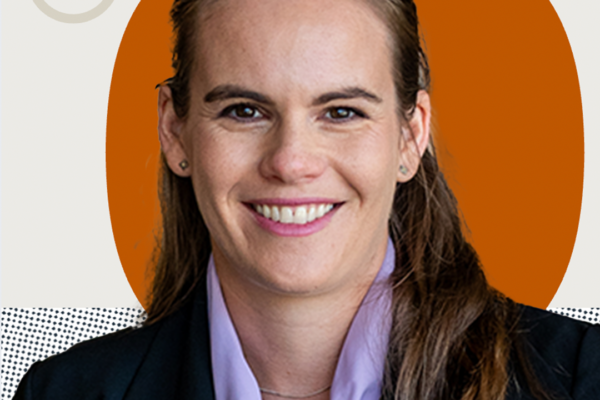Startup City Limits Spotlights Student Innovation
The inaugural conference celebrates entrepreneurship in the Longhorn community

As a major hub for startups, Austin and entrepreneurship go hand in hand. So, it’s no surprise that the entrepreneurial mindset that built Austin is alive and well at McCombs and The University of Texas. The University has been a launching pad for many startup companies, allowing students to connect with their peers, mentors, and investors, and bring innovative ideas to life with the institution’s research and technical tools at their disposal. The spirit of innovation among the Longhorn community took center stage April 19 at the first-ever Startup City Limits conference, sponsored by the newly dedicated Harkey Institute for Entrepreneurial Studies at Texas McCombs.
Student startup exhibitions
Startup City Limits featured 29 companies founded by alumni and current UT students, representing a diverse array of industries: education, health care, robotics, gaming, food and beverage, fashion, and more. Student representatives also showcased programs supporting innovation on campus, including Texas Inventionworks and Texas Momentum, UT’s student-led startup accelerator.

Student founders showed off their cutting-edge ideas to the community at booths throughout the day. Paradigm Robotics, co-founded by Cockrell School of Engineering student Siddharth Thakur, introduced attendees to FireBot, an unmanned ground vehicle that can be deployed into burning buildings for rescue operations. Paradigm Robotics has already attracted attention and potential investors from the startup community thanks to its official selection as a finalist in the 2024 SXSW Pitch competition.
Fellow SXSW pitch finalists Merge Conflict Studios — an independent game design studio founded by six UT students and alumni — gave guests a sneak peek of their upcoming release with a live gameplay demo. The studio’s new release follows the success of its first game, Re:Fresh, which was nominated for Best Student Game at the 2023 Unity Awards and earned a 9/10 user rating on the Steam platform.
Of course, some ideas were too big to showcase at a booth in the Rowling Hall atrium. So, instead, the founders of Verified Carbon presented the blueprints for their carbon capture and storage technology. Their vision is to use Direct Air Capture (DAC) technology to remove excess carbon from the atmosphere and store it safely in underground tanks, mitigating the effects of climate change for a more sustainable future. The company was co-founded by Coleman White, BBA ’23 and current MSTC student, with support from current MSTC student Pohul Khera, BBA sophomore Abhinav Yarlagadda, and first-year BBA student Philip Nguyen.

Tech wasn’t the only industry represented at Startup City Limits: Attendees could also sample products from food and beverage companies founded by UT entrepreneurs. McCombs sophomore Akeila Tejwani offered guests fresh-baked, allergen-free mini cupcakes from her business, Akki’s Cupcakery & Tea. If they could handle the heat, guests also got a taste of Fired Up! Hot Sauce, an original recipe conceived by McCombs junior Grayson Cloutier using Texas-grown chili pequin peppers. Attendees over the age of 21 could sip “cold booze” — American whiskey mixed with cold brew — by Bold Move Beverages, founded by Jacob Guss, B.S. ’15, MBA ’22, and a selection of local favorites by Zilker Brewing Co., co-founded by Forrest Clark, BBA ’00.
Keynote speakers

Over the years, many UT alumni have elevated their small startups into large, successful companies. Startup City Limits invited these alumni to return to campus as keynote speakers and share their expertise with students who want to take their entrepreneurship to the next level.
Keynote sessions kicked off with a one-on-one discussion between Ben Weiss, MBA ’03 and founder of Bai Brands, and Lamarr Houston, B.S. ’11, MSTC ’22, and co-founder of BoxxTech. Both founders had an unconventional journey to entrepreneurship: Houston played in the NFL for eight years before making the pivot to tech, and Weiss came up with the idea for Bai’s antioxidant-infused flavored water by experimenting with drink recipes in his basement. Their discussion, titled “Cruising Through Challenges: Fail to Succeed,” highlighted how failure isn’t something you can avoid in entrepreneurship. It’s a necessary step to building the resilience that can lead to success.
Another session, “Milestones and Pitstops: Entrepreneurs Navigating the Business Highway,” brought together successful alumni entrepreneurs to look back at where they started and how they got to where they are now. The panelists represented a diverse set of backgrounds and industries: Melody Afkami, B.A. ’04, founded her company, Melody DanceFit, after finding joy in dance classes outside her corporate job. Luke Schneider, B.S. ’90, broke away from a role at Ford Motor Co. to shepherd several early-stage transportation startups to success and is now CEO of Refraction AI — a company that deploys autonomous robots to deliver takeout food, groceries, and packages. John Scott, B.A. ’85, worked to mass-produce Stubb’s barbecue sauce and grew it into one of Austin’s most recognizable brands before founding Four Corners Sourcing. Although their products and services seem vastly different, the panelists found plenty in common among their entrepreneurial journeys: the tenacity and resilience they developed, the trust that they had in the people around them, and the passion that paved the way toward their goals.
The Harkey Institute: A New Era of Entrepreneurship at UT

The event was made possible by John D. Harkey Jr., BBA ’83, a leader, investor, and CEO whose financial gift established the Harkey Institute for Entrepreneurial Studies at the McCombs School of Business. As Startup City Limits demonstrates, student entrepreneurship is on the rise at UT: It’s the second-most-popular minor across all colleges, and every field of study — from business to science to liberal arts — is represented in the minor program. The Harkey family’s gift will empower students with interdisciplinary education and extracurricular experiences to support their entrepreneurial endeavors for years to come.
— Story by Amanda Waxman
About this Post
Share:


